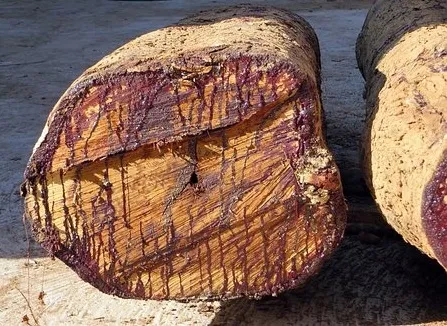Are Chinese Projects Threatening West Africa's Environmental Integrity?

Synopsis
Key Takeaways
- Chinese infrastructure projects threaten West Africa's ecological integrity.
- Illegal logging, particularly of rosewood, is rampant.
- Community-based management practices are being undermined.
- Urgent action is needed to protect natural resources.
- West African nations should confront foreign exploitation.
Abuja, Oct 24 (NationPress) Chinese infrastructure and mining projects in West Africa have encroached upon untouched forest and conservation regions, resulting in habitat fragmentation and jeopardizing the ecological health of essential landscapes, a report has revealed.
According to a report from the American think tank Atlantic Council titled 'Chinese Demand for Timber and Wildlife in West Africa: Responding to the Environmental and Social Impacts', Uganda-based media outlet PML Daily reported that these initiatives often undermine community-led forest management efforts and marginalize local populations.
Environmental advocates in West Africa have raised alarms over extensive deforestation driven by the escalating demand from Chinese suppliers worldwide. Recently, officials in Ogun State, Nigeria, shut down five Chinese companies and detained several employees for allegedly attacking enforcement officers conducting their duties,” the report stated.
“Previously, these companies faced closures due to serious environmental infractions, including improper waste management, open waste incineration, and refusal to collaborate with government-recognized waste collectors. Such occurrences are not only prevalent in Nigeria but are increasingly common throughout West Africa,” it stressed.
The report highlights that the primary issue is illegal logging, particularly of rosewood and other premium timber species across Nigeria, Ghana, Gambia, Mali, Côte d'Ivoire, Sierra Leone, and Liberia, leading to significant deforestation, including in protected zones.
Driven predominantly by Chinese demand, rosewood has emerged as the most trafficked illegal wildlife commodity globally, surpassing even ivory and rhinoceros horn combined.
“Ironically, the environmental repercussions have greatly surpassed any economic gains. Large-scale land acquisitions and infrastructure initiatives have resulted in forest conversion, eroded community land rights, and threatened various species,” the report indicated.
“In nations such as Ghana, Liberia, Nigeria, Côte d'Ivoire, and Sierra Leone, Chinese companies are often linked with both legitimate and illegal timber activities. Moreover, Chinese-backed agribusiness projects—particularly in rubber and palm oil—have led to vast land acquisitions and deforestation, undermining traditional land tenure systems and disrupting local livelihoods,” it added.
The report underscored that evidence from across West Africa illustrates how China’s unchecked exploitation of forests, minerals, and wildlife has caused severe environmental harm and destabilized local communities.
It further noted that as China enhances its diplomatic and economic influence, West African nations must urgently unite and take a decisive stance.
“It is imperative for these countries to confront Beijing directly and demand an immediate cessation to the destruction of their natural resources. Should China decline to cooperate, West African governments must elevate the issue to global platforms, ensuring the world acknowledges and responds to this escalating ecological and humanitarian crisis,” the report concluded.









